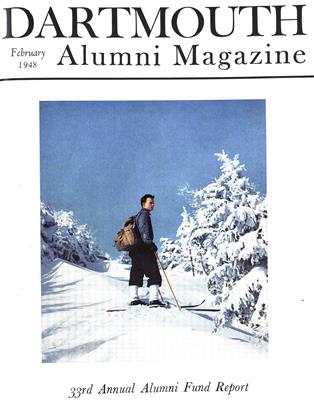OF SPECIAL INTEREST to the Dartmouth 'family is Frances Tysen Nutt's Three Fields to Cross, published late in 1947 by Stephen-Paul Publishers, New York. Mrs. Nutt is the wife of Henry H. Nutt '13 and the mother of David Nutt '44 and Robert Nutt '49, who left Dartmouth to join the Army and is now in the Pacific. I read this novel with a good deal of pleasure and, in fact, with considerable enlightenment. It tells the story of a family of Staten Islanders who live through the American Revolution from April 1774 to December 1780, when the British cause was definitely lost. The Blakes suffer the vicissitudes of war in all its aspects.
As a woman Mrs. Nutt hates war, and sees it as a stupid way of settling things, as indeed it is. Let women run things and there would be no more wars? Or bigger and better ones? The theory is that their innate common sense, the fact that they are the heavy sufferers, would work definitely for peace. This has not been true with the women of Germany but it may be true nonetheless.
Mrs. Nutt writes with competence; there is nothing amateurish about her story, her handling of her characters, or her style. In fact Three Fields to Cross is one of the better historical novels of 1947 that I have read. Its value is enhanced by the fact that it is based on family documents handed down. Mrs. Nutt knows her terrain as her family still owns part of the original land from a grant received back in 1667. I hope you will read and enjoy, as I did, this excellent novel.
George Matthew Adams, who has given Dartmouth so many fine editions, has a remarkable nose for good literature. How he manages to ferret out and read so many excellent books, busy as he is with a flourishing syndicate, will always be a mystery to me. For Christmas he sent one of the most thoughtful books I have read in many a season. It is called TheHuman Situation; the author is the late W. MacNeile Dixon; the publisher is Longmans, Green 8c Cos. The substance of the book was given as the Gifford Lectures, 1935-1937. (This Scottish foundation is famous and William James and John Dewey also gave lectures: Varietiesof Religious Experience and The Questfor Certainty.) Dixon writes as a humanist but he is well aware of the importance and value of science. I know of no book which will better answer the modem dilemma; the reconciliation of science, which we must accept, and humanism, which we must live by. The modern man will find something here I think he can believe in. One reviewer said of this book: "I consider it as perhaps the most important book of its kind which the twentieth century has produced."
I continue to enjoy De Voto's Acrossthe Wide Missouri, which is enlivened with superb and interesting paintings of the early West by Alfred Jacob Miller here reproduced for the first time, and others by Charles Bodmer and George Catlin. In this handsome book you will find recorded the known facts about the Rocky Mountain fur trade, and the men who took part in this, and the opening of the West.
Robin Maugham's book Nomad (London, 1947) will illuminate for you the recent Palestine partition, as this former Tank Corps officer (author of Come toDust, one of the best of this war's books) herein tells of several years spent with the Arabs, partly under the tutelage of the fabulous J. B. Glubb, head of the Arab legion, and Major Altounyan, friend of the late T. E. Lawrence.
Also from England comes a strange novel, described by the publisher Andrew Melrose as "unquestionably the most remarkable first novel that it has been our privilege to publish." It is an amazing blend of imagination and erudition mixed up in an adventure story in which Shakespeare's holograph autobiography is featured and the danger is depicted of "the holy gangsters who over the centuries have always been so busy preparing victims, both animal and human, for the fire." The author is Albert Viney; the book The Ballet of MomentsUnborn.
One of the best crime stories I have read for a long time is Edgar Lustgarten's One More Unfortunate (Scribner's, 1947). This story of a crime of passion, with a shrewd, plausible and astounding denouement, is laid in Soho and the London courts, and is a minor masterpiece of crime fiction.
 View Full Issue
View Full Issue
More From This Issue
-
 Article
ArticleATOMIC ENERGY CONTROL
February 1948 By CHESTER I. BARNARD, -
 Class Notes
Class Notes1949
February 1948 -
 Class Notes
Class Notes1918
February 1948 By ERNEST H. EARLEY, DONALD L. BARR, DAVID L. GARRATT -
 Class Notes
Class Notes1935
February 1948 By H. REGINALD BANKART JR., FREDERICK T. HALEY, ROBERT W. NARAMORE -
 Class Notes
Class Notes1931
February 1948 By A. W. LAUGHTON, WILLIAM H. SCHULDENFREI, ERNEST H. MOORE -
 Class Notes
Class Notes1924
February 1948 By JAMES T. WHITE, RICHARD A. HENRY, DONALD E. COYLE
HERBERT F. WEST '22
-
 Article
ArticleHANOVER BROWSING
October 1934 By Herbert F. West '22 -
 Article
ArticleHanover Browsing
January 1943 By HERBERT F. WEST '22 -
 Books
BooksSHORT CUT TO TOKYO,
October 1943 By Herbert F. West '22 -
 Article
ArticleHanover Browsing
December 1945 By HERBERT F. WEST '22 -
 Article
ArticleHanover Browsing
February 1951 By HERBERT F. WEST '22 -
 Article
ArticleHanover Browsing
November 1957 By HERBERT F. WEST '22








